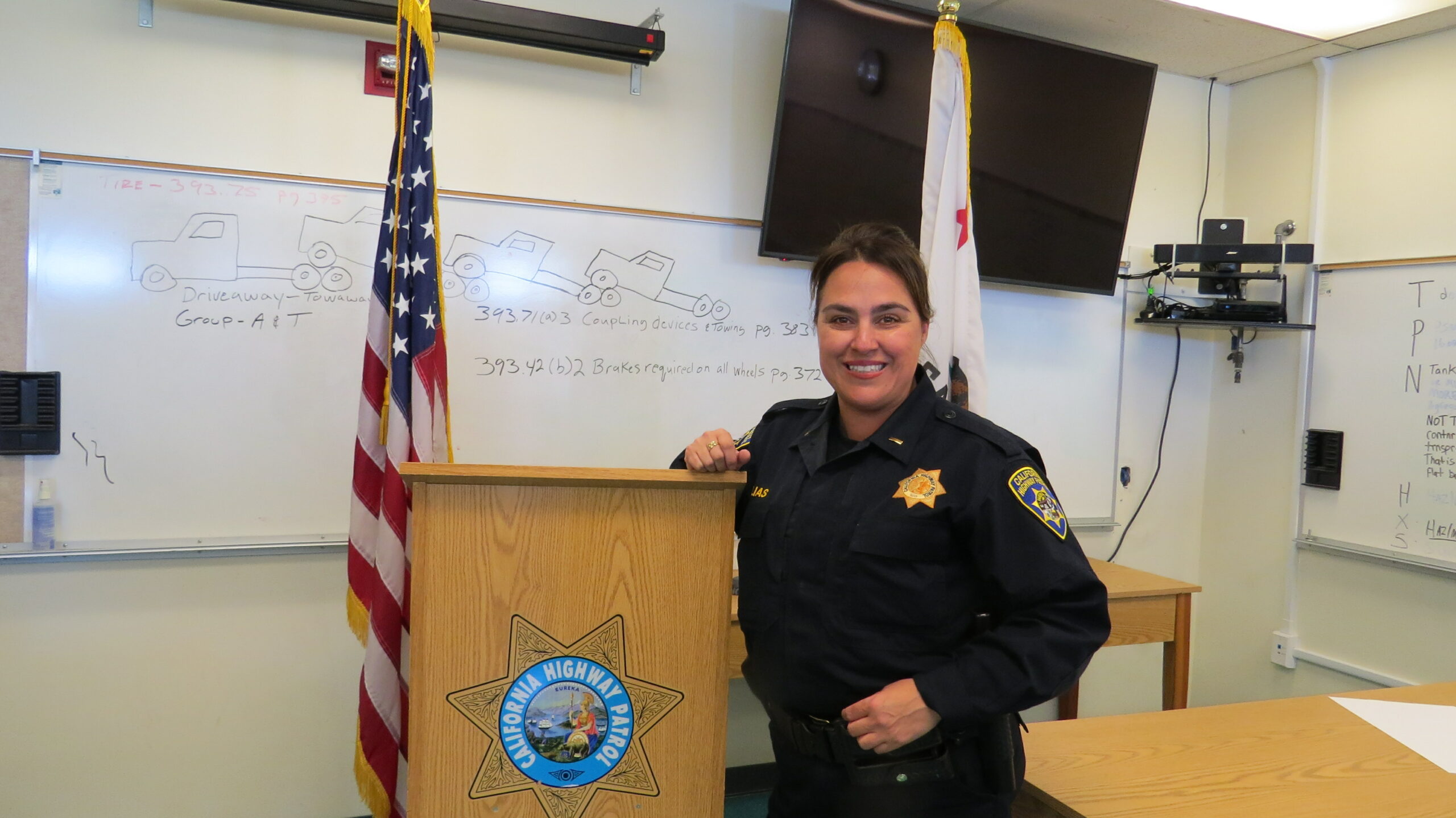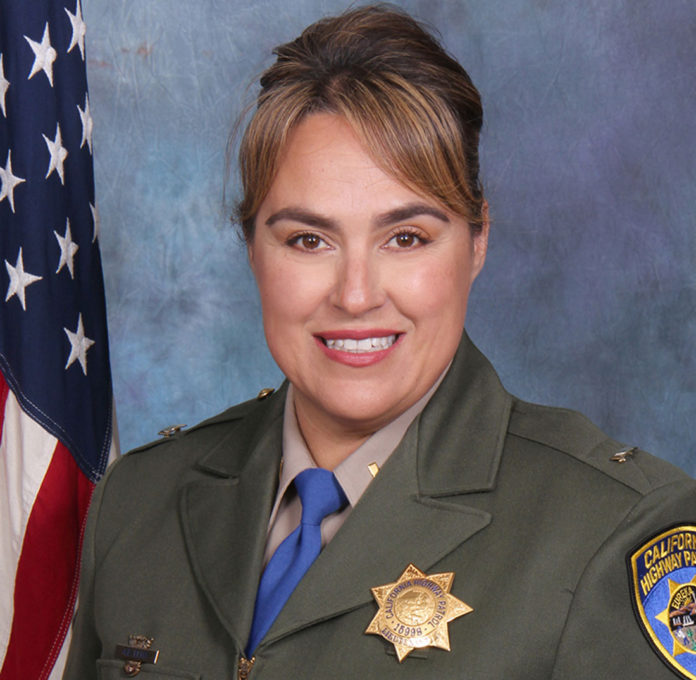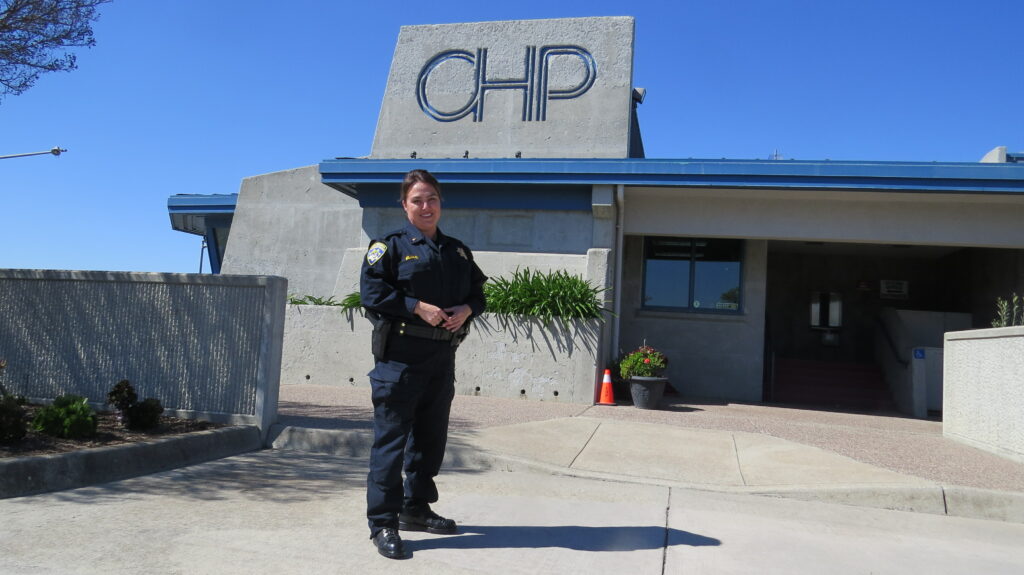Erica Elias was born in Gilroy and raised in Hollister, went to Gavilan
![]()

Photo by Marty Cheek
Erica Elias is new commander at the CHP’s Commercial Vehicle Enforcement Facility.
By Marty Cheek

Lt. Erica Elias
As Women’s History Month began, Erica Elias made history herself by becoming the first female commander of the California Highway Patrol’s Commercial Vehicle Enforcement Facility in Gilroy. On March 1, she took charge of running the site on U.S. 101 north of Masten Avenue.
For the lieutenant, this milestone is deeply meaningful. Born in Gilroy and raised in Hollister, she attended San Benito High School (now called Hollister High School) and Gavilan College before embarking on her law enforcement career at age 21. She encourages young men and women to consider a career in the CHP.
“If I can do this profession as a first generation, born in the USA of Mexican parents — my first language was Spanish — then anyone can do this,” she said.
With her appointment coinciding with the 50th anniversary of women training to be officers in the CHP, Elias stands as an example of progress and possibility. Her story is a testament to the power of perseverance, the importance of representation, and the enduring impact of trailblazers who break barriers and inspire generations to come.
After graduating high school, Elias considered getting a degree in criminal justice because she thought she was going to be an attorney. She went for a short time to California State University Stanislaus. Her journey changed course when she applied to the CHP and was hired in 1999. She graduated at age 22 after six months of training at the West Sacramento live-in academy.
 Her decision to join had been influenced by her stepdad who had two brothers who were officers. He told her the job provided great benefits and good pay as well as the camaraderie. As she patrolled the roads and highways, she found so much more in the career — a purpose of serving her community.
Her decision to join had been influenced by her stepdad who had two brothers who were officers. He told her the job provided great benefits and good pay as well as the camaraderie. As she patrolled the roads and highways, she found so much more in the career — a purpose of serving her community.
“I just love it. You’re paying me to enforce the laws and actually help people,” she said. “A lot of times people think it’s all bad and negative. And sure, sometimes the fatalities — especially involving children — throughout my career have been traumatic and ugly and you have to give bad news . . . But I think that it’s definitely been more positive than negative.”
During her nearly 25 years in law enforcement, she gained extensive experience and rose through the ranks. Her fluency in Spanish has been a valuable asset, enabling her to connect with and educate the Spanish-speaking community through the “El Protector Program” about road laws and safety practices. The Spanish-speaking officers often go to public events and interact with people, helping to build trust. And fluency in the language helps when an officer pulls a driver over.
“Being able to speak to people in Spanish can make the difference between a good arrest and a bad arrest,” Elias said. “I was able to tell them what is going to happen. They understand, they feel calmer and the situation is often diffused.”
During her career, Elias even found herself working at times as a local public information officer at press conferences or with the media. She even frequently appeared on a San Jose radio talk show to answer questions in Spanish about driving laws. She enjoyed spending time as a technician at hospitals training new Spanish-speaking parents on how to properly install their car seats to keep their infants safe.

Photo by Marty Cheek
Erica Elias is new commander at the CHP’s Commercial Vehicle Enforcement Facility.
As commander of the Gilroy inspection facility, Elias oversees a critical operation focused on ensuring the safety of commercial vehicles. The large vehicles drive into an inspection bay at the facility where technicians examine them top to bottom for problems that could result in a major accident if left unresolved. Under her leadership, the facility conducts inspections on a wide range of vehicles from semi-trucks to buses chartered by companies like Google and Facebook. Elias and her team also work diligently to educate drivers and trucking companies about safety regulations and the importance of compliance.
“Everything is about safety. Safety for the public out there,” she explained. “Enforcement is just one aspect. Education is another component. We try to get ahead of it.”
Reflecting on her achievement, Elias acknowledged the challenges she has faced as a woman in a historically male-dominated field. About five or six percent of CHP employees are females, she said.
“They’re always trying to hire more women,” she said. “It’s just because we’re trying to represent the community we serve. We want to represent what is out here.”
However, she credits the trailblazing women who came before her for paving the way. The first women recruits to go to CHP Academy in 1974 were “the ground-breakers” for the women, like her, who would follow in their footsteps, she said.
 “I think that the women who came before me had a more difficult time. They paved the way,” she said. “I still keep in touch with those women. They had it harder.”
“I think that the women who came before me had a more difficult time. They paved the way,” she said. “I still keep in touch with those women. They had it harder.”
Among the women who served as a role model in the CHP is its recently retired Commissioner Amanda Ray, who became the first woman to hold that position of the agency’s highest leader.
“Once she got to that point, it was pretty much women can go all the way,” Elias said. “Attitudes have changed about whose job belongs to who. Men have their strengths and weaknesses, just like women do. . . . Sometimes women diffuse situations with their verbal skills, or just because they’re a nurturing type. You de-escalate the situation or diffuse a situation where a man might be ready to go hands-on with use of force. That’s been my experience.”
As a knowledgeable and proficient law enforcement professional with ties to the local communities she serves, Lt. Elias was an easy pick for the Gilroy Commercial Vehicle Enforcement Facility, said her boss, Assistant Chief Kyle Foster. Before being selected, her eight years of supervisorial experience at the scale as a sergeant trained her how to oversee the daily operations.
 “She is a role model for women and minorities and is a glowing example of what anyone can achieve through hard work and dedication,” he said. “She is a trusted leader in CHP’s Coastal Division and a valued member of our management team.”
“She is a role model for women and minorities and is a glowing example of what anyone can achieve through hard work and dedication,” he said. “She is a trusted leader in CHP’s Coastal Division and a valued member of our management team.”
As a representative of the CHP’s El Protector program, she has been instrumental in reaching out to all segments of society to garner interest in the profession of policing, Kyle said.
“Beyond bridging the cultural gaps of the communities she serves, Erica has gone out of her way to support women in her community and on the highway patrol,” he said.
She has been involved in California’s annual Women Leaders in Law Enforcement (WLLE — California Police Chiefs Association) training symposium and seeks to support uniformed and non-uniformed female employees in achieving their goals and aspirations.
Balancing her career with motherhood has not been easy. A single mom since 2008, she raised three daughters, the youngest 10, the middle is a high schooler and the oldest goes to Gavilan. They see her as a role model and “supermom.” Despite the obstacles, her Catholic religion and personal determination have kept her moving forward.
“My mother instilled in me a strong faith and if there’s bumps in the road, you just keep going,” she shared.
As Elias settles into her role, she hopes to inspire others, particularly those from the community, to consider a career in law enforcement. “When people see me, maybe I am motivating that younger girl,” she said. “They see me and think, ‘If you can do it, I can do it.’ You can, if you go one step at a time.”






